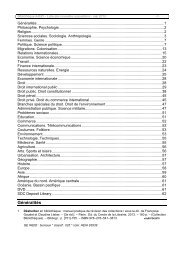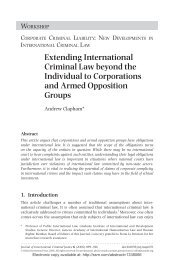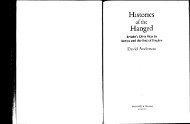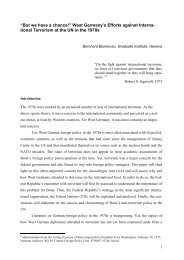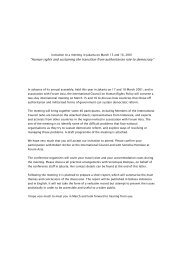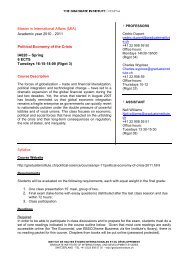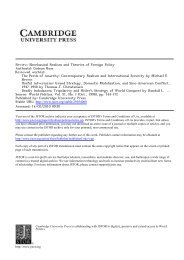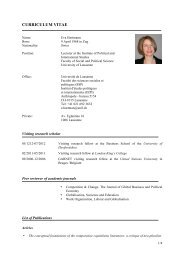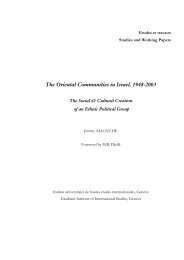The 1953 Coup D'etat in Iran Author(s): Mark J. Gasiorowski Source ...
The 1953 Coup D'etat in Iran Author(s): Mark J. Gasiorowski Source ...
The 1953 Coup D'etat in Iran Author(s): Mark J. Gasiorowski Source ...
You also want an ePaper? Increase the reach of your titles
YUMPU automatically turns print PDFs into web optimized ePapers that Google loves.
<strong>The</strong> <strong>1953</strong> <strong>Coup</strong> D'Etat <strong>in</strong> <strong>Iran</strong> 263<br />
<strong>The</strong> first component of this strategy consisted of a series of legal maneuvers.<br />
<strong>The</strong> International Court of Justice was asked to arbitrate the oil dispute. A<br />
negotiat<strong>in</strong>g team was sent to Tehran with a proposal that recognized the pr<strong>in</strong>ciple<br />
of nationalization but called for the AIOC to market <strong>Iran</strong>'s oil on a 50-50 profit-<br />
shar<strong>in</strong>g basis. This proposal was rejected by Mosaddeq <strong>in</strong> June 1951. Negotiations<br />
were reopened <strong>in</strong> August under a mission led by Richard Stokes. Stokes's<br />
proposal differed little from the previous British offer, and was soon rejected by<br />
Mosaddeq. <strong>The</strong> British thereafter refused to negotiate directly with Mosaddeq<br />
and relied <strong>in</strong>stead on appeals to the International Court, the United Nations, and<br />
on mediation by the United States.<br />
<strong>The</strong> second component of the British strategy was to underm<strong>in</strong>e Mosaddeq's<br />
base of support by impos<strong>in</strong>g economic sanctions on <strong>Iran</strong> and carry<strong>in</strong>g out<br />
military maneuvers <strong>in</strong> the region. <strong>The</strong> AIOC began a production slowdown <strong>in</strong><br />
May and prevented tankers from load<strong>in</strong>g oil at Abadan. By the end of July,<br />
these steps had evolved <strong>in</strong>to a full-fledged blockade, which was jo<strong>in</strong>ed by the<br />
other major oil companies. A British paratroop brigade was sent to Cyprus <strong>in</strong><br />
mid-May and the cruiser Mauritius was sent to Abadan. <strong>The</strong>se actions led<br />
Mosaddeq to announce that the first shot fired would "signal the start of World<br />
War III."9<br />
With the collapse of the Stokes negotiations, the AIOC announced that it<br />
would take legal action aga<strong>in</strong>st anyone buy<strong>in</strong>g <strong>Iran</strong>ian oil. Brita<strong>in</strong> asked its<br />
European allies to discourage their citizens from seek<strong>in</strong>g employment with the<br />
newly-formed National <strong>Iran</strong>ian Oil Company (NIOC). In early September, an<br />
embargo was begun on British exports to <strong>Iran</strong> of iron, steel, sugar, oil process<strong>in</strong>g<br />
equipment, and goods that could be resold for dollars. Twenty thousand oil<br />
workers were laid off by the AIOC at Abadan, forc<strong>in</strong>g Mosaddeq to put them on<br />
the government payroll. Sterl<strong>in</strong>g conversion privileges were cancelled and other<br />
f<strong>in</strong>ancial restrictions were imposed which violated a memorandum of under-<br />
stand<strong>in</strong>g between the two governments. Four British destroyers jo<strong>in</strong>ed the<br />
Mauritius <strong>in</strong> September and held fir<strong>in</strong>g practice near Abadan. British land and<br />
air forces <strong>in</strong> the region were also strengthened.?1<br />
<strong>The</strong> third component of the British strategy was to try to remove Mosaddeq<br />
from office. This was to be achieved ma<strong>in</strong>ly through covert political action,<br />
undertaken with the help of a network of pro-British politicians, bus<strong>in</strong>essmen,<br />
military officers, and religious figures. <strong>The</strong> pr<strong>in</strong>cipal figures <strong>in</strong> this network were<br />
the Rashidian brothers, who had been the ma<strong>in</strong> British agents <strong>in</strong> <strong>Iran</strong> s<strong>in</strong>ce the<br />
early 1940s. Another important element <strong>in</strong> the British net was a group of<br />
prom<strong>in</strong>ent, pro-British politicians. <strong>The</strong>se <strong>in</strong>cluded Sayyid Zia Tabataba'i, whom<br />
the British sought to <strong>in</strong>stall as prime m<strong>in</strong>ister, and Jamal Emami, who headed a<br />
pro-British faction <strong>in</strong> the Majlis."<br />
<strong>The</strong> British began to pressure the Shah to <strong>in</strong>stall Sayyid Zia even before<br />
Mosaddeq came to power. <strong>The</strong> Shah was apparently agreeable, and was re-<br />
portedly discuss<strong>in</strong>g the matter with Sayyid Zia when the Majlis nom<strong>in</strong>ated<br />
Mosaddeq. <strong>The</strong>se efforts cont<strong>in</strong>ued after Mosaddeq assumed office. In June<br />
1951, W<strong>in</strong>ston Churchill and Anthony Eden, leaders of the Conservative opposi-<br />
tion <strong>in</strong> Brita<strong>in</strong>, suggested to the Foreign Office that an Anglo-American approach



![Download [pdf] - The Graduate Institute, Geneva](https://img.yumpu.com/23370020/1/190x248/download-pdf-the-graduate-institute-geneva.jpg?quality=85)
